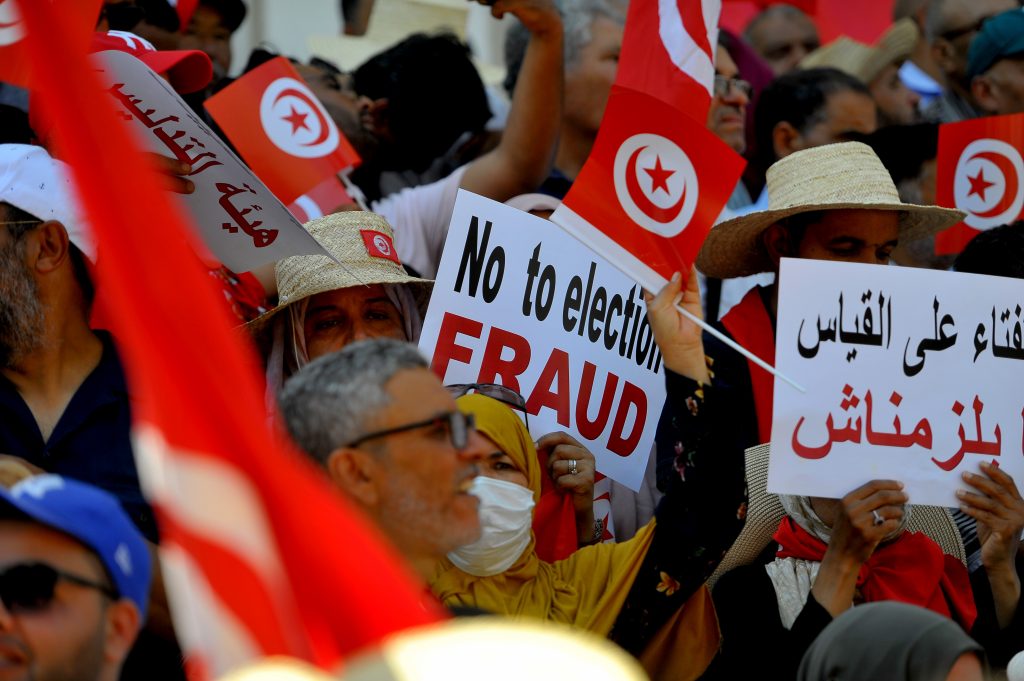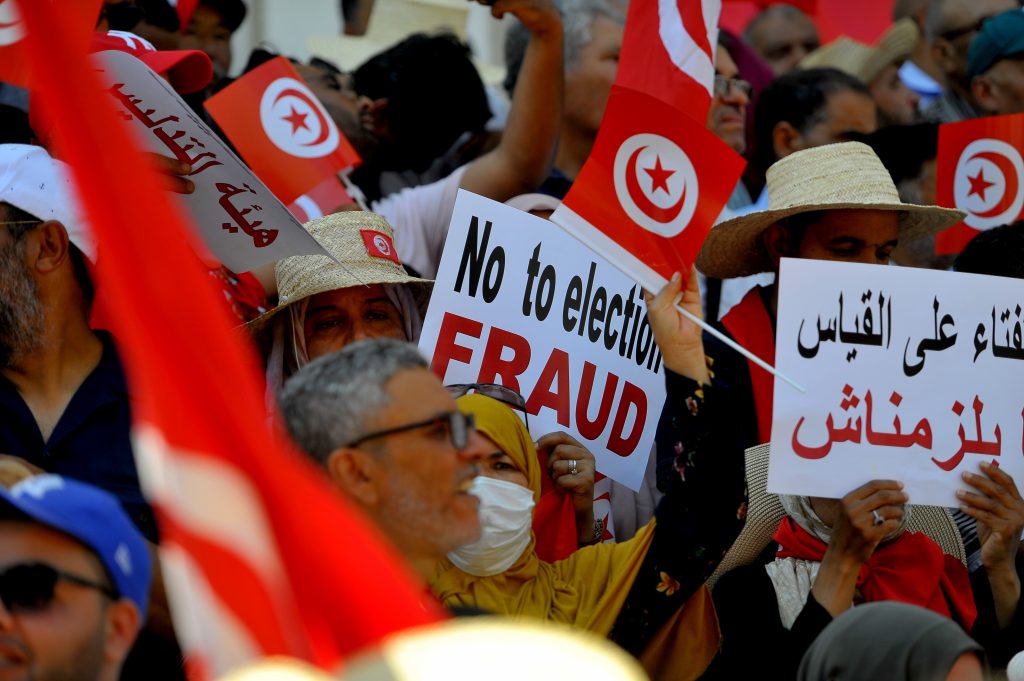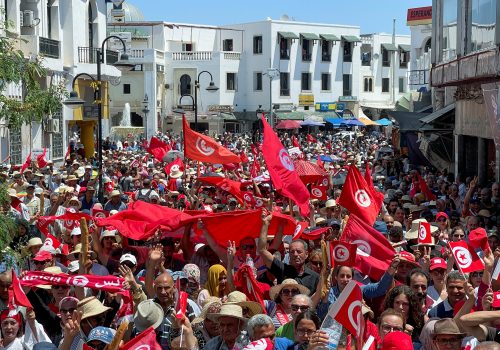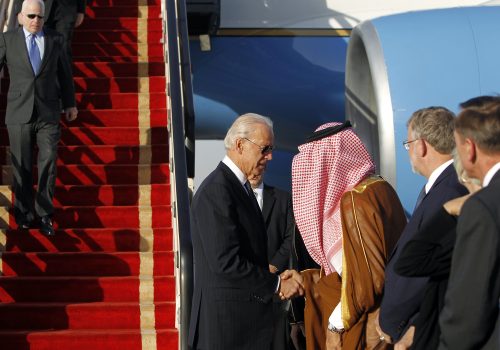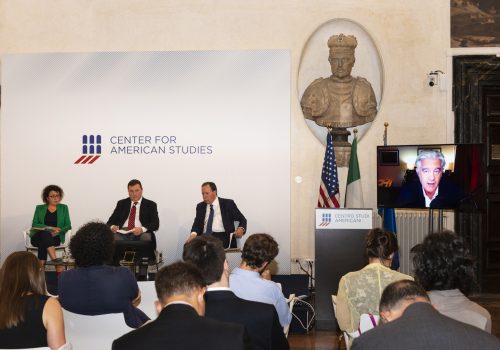On September 14, the Atlantic Council’s North Africa Program and the US Embassy in Italy hosted an event with experts on the field to discuss the potential for Italy to become a mediating power in the Mediterranean. The event included: Emadeddin Badi, Nonresident Senior Fellow, Atlantic Council; Patricia Karam, Regional Director, International Republican Institute; Alessia Melcangi, Nonresident Senior Fellow, Atlantic Council; Roberto Menotti, Senior Advisor for International Activities, Aspen Institute Italia; and Alissa Pavia, Associate Director, Atlantic Council.
Key Takeaways
Italy has a vested interest in the Mediterranean region, due not only to longstanding cultural and historical ties, but also to migration and more recent economic issues.
This is a critical moment in Italy-US relations, especially regarding how the two countries can work together in the Mediterranean. In the aftermath of US President Joe Biden’s election, there is potential for cooperation between the US and Italy, especially in light of former US President Donald Trump’s more adversarial stance towards the European Union, which proved to be paralyzing and detrimental to EU-US cooperation.
The panel shed light on several challenges facing North Africa and if, and how, Italy could play a critical role. The primary challenges are Egypt and Turkey’s rivalry, the tensions between Morocco and Algeria, and the ongoing state of conflict in Libya. Among other things, these crises also have the potential to cause an increase in migration to Italy, already a major destination for migrants from North Africa, as well as create the security challenges that come from civil wars such as illicit arm deals and human smuggling. The panel agreed that, in one way or another, these issues strongly affect Italy and that Italy should therefore take them into consideration. According to Melcangi, the rivalry between Turkey and Egypt is a possible source of destabilization in the Mediterranean. Italy should address it by cooperating with the US and the EU on shared concerns and addressing common challenges. For example, Italy could facilitate dialogue between these two countries and try to create space for new multilateral initiatives through track two diplomacy.
Pavia and Menotti noted that Italy should also account for the tensions between Algeria and Morocco. The major issue is that of sovereignty over Western Sahara—an issue of vital importance to both countries. In November 2020, Western Sahara retook center stage in the rivalry between Algeria and Morocco after the Polisario Front, backed by Algeria, declared a resumption of hostilities after a 30-year-long ceasefire.
This led in August 2021 to the complete breakdown of all diplomatic relations between Morocco and Algeria. In addition, Algeria felt isolated and intimidated by the normalization agreement signed in December 2020 between Morocco and Israel. However, Italy is not in a position to make enemies with Morocco or Algeria by attempting mediation in the region. Italy is now, more than ever, reliant on Algeria’s gas and will only grow to be more so with its goal of becoming less reliant on Russian gas. Morocco and Italy have strong economic and trade ties, and there are currently about 0.5 million Moroccans living in Italy. Thus, Italy should find a way to balance these interests without hurting its relationship with either.
According to Badi, Italy is a constructive interlocuter and understands Libya well by geographic proximity but fails to use this relationship to its advantage and translate it into meaningful policies in the country. Italy also has interests in migration, oil, and gas in Libya, as well as historical and cultural links. Mezran noted that a special, more direct US-Italy cooperation in Libya seems unlikely and that when Italian Prime Minister, Mario Draghi, addressed the US government for an endorsement vis-a’- vis their involvement in Italy, nothing came of it.
Badi added that the war in Russia has contributed to Libya worsening crisis, as the Russian government has used its military footprint to expand in Libya and Sub-Saharan Africa, and expressed his regret that this has not spurred any action in foreign policymaking. He added that he wished the wave of Ukrainian solidarity would have transcended the intra-European dimension and encouraged policymakers to look beyond the Eastern European theaters.
Menotti added that in all these issues, the fundamental problem is the Franco-German relationship, and until Germany joins the effort, it will be difficult to reach a consensus at the European level. Menotti concluded by saying that these issues should be kept high on the Italian agenda, and it is the job of the foreign minister, the diplomats, and even the Italian intelligence community to keep pushing these issues and emphasize that if these are not addressed, they will become a crisis.
Mezran concluded the event by thanking the partners, the US Embassy in Italy, and expressing his sincere gratitude to all those who joined the event.
Madeline Hart is a Young Global Professionals with the Middle East Programs at the Atlantic Council.
Further reading
Mon, Aug 29, 2022
North Africa’s transatlantic relations amid change and continuity
Report By
The purpose of this report is to identify a potential role for Italy and its diplomacy to play in North Africa, in full agreement and collaboration with the United States and the other main European actors.
Tue, Jul 12, 2022
Evolving MENA power balances: What is next for US engagement in the region?
In-Depth Research & Reports By
US President Joseph R. Biden Jr.’s upcoming visit to the Middle East provides an opportunity to assess what role the United States will play in the Middle East and North Africa in the future. With the war in Ukraine further diverting US attention from the region, the big question is whether the region is entering a ‘post-US’ era.
Thu, Jun 16, 2022
A new transatlantic relationship for the Middle East and North Africa
Event Recap By
On June 7, the Atlantic Council’s (AC) North Africa Initiative hosted an event, “New Transatlantic Relations for the Middle East and North Africa,” in collaboration with US Embassy Rome and Centro Studi Americani. Moderated by Karim Mezran, director of the AC’s North Africa Initiative and resident senior fellow at the Atlantic Council, the event explored […]
Image: Tunisian protesters raise a flags and placards on July 23, 2022, during a demonstration along Habib Bourguiba avenue in the capital Tunis, Tunisia against their president and the upcoming July 25, 2022 constitutional referendum. (Photo by Yassine Mahjoub/Sipa USA)No Use Germany.
